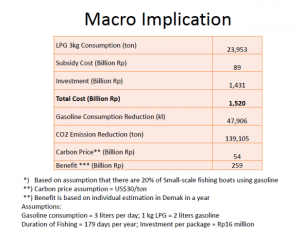On 8 September 2016, the Indonesian Institute of Sciences (LIPI) hosted an FKP Seminar in which two studies related to energy were presented. The second presentation was by Chitra Indah Yuliana (LIPI) on the results of a socio-economic impact assessment of small-scale fishing boats oil fuel to LPG conversion in Indonesia. This is an important issue fuel accounts for 37.5% (inboard) and 50% (outboard) of the total cost of fishing (outside of wages. Furthermore, a study by the Indonesia Fishing Technology Development Center (BBPI) in 2016 indicated that 70% of the total cost in small-scale fishing is for fuel.
The study presented aims to analyze oil fuel to LPG conversion programs for small-scale fishing boats, investigate conditions of hard and soft infrastructures and suitability of targeted recipients in the program, and analyze achievements from the point of view of policy. Several types of data were utilized in the research, including primary data such as in-depth interviews and data from various agencies, and secondary data such as that from literatures and previous publications. The study locations included Cirebon and Purwakarta (West Java), Pekalongan and Demak (Central Java) an Karangasem (Bali).
Some research findings are as follows. In Purwakarta and Pekalongan, it is relatively easier for fishermen to get LPG than gasoline, yet they need a pioneer among the local fishers to implement the LPG conversion program. Fishermen were only willing to convert to LPG to power their boats only after a proof of concrete benefits of the conversion was provided. On the other hand, the conversion pilot in Demak initially faced regulatory issues since there is no legal protection for the use of 3 kg LPG tanks (which are subsidized and to only be used by the poor) so local fishers were given 12 kg tanks which the fishermen converted to 3kg on their own.
In addition to some problems in application, there is a concern mainly regarding the continued and reliable supply of LPG, price disparity, and potential for scarcity of LPG in several areas. Additionally, safety standards and education are also of primary importance in the implementation of the conversion.
Overall, local fishers there have informed that the fuel conversion packages have been very useful to improve their fishing activities. The study finds that the conversion resulted in fuel cost reduction (60% with subsidized LPG or 30% with non-subsidized LPG), time efficiency, larger fishing ground, and lower rate of emission. But with such achievement, there exists concerns regarding the increasing burden of government budget in terms of subsidy cost and extra cost for providing LPG with certain specifications and safer tube. The option is for government to reduce LPG subsidy gradually.
